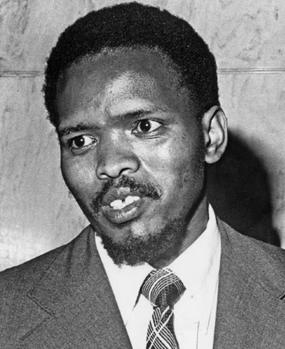On 11 September 1977, police loaded him in the back of a Land Rover, naked and restrained in manacles, and began the 1,100 kilometres (680 mi) drive to Pretoria to take him to a prison with hospital facilities. He was nearly dead owing to the previous injuries. He died shortly after arrival at the Pretoria prison, on 12 September. The police claimed his death was the result of an extended hunger strike, but an autopsy revealed multiple bruises and abrasions and that he ultimately succumbed to a brain hemorrhage from the massive injuries to the head, which many saw as strong evidence that he had been brutally clubbed by his captors. Then Donald Woods, a journalist, editor and close friend of Biko's, along with Helen Zille, later leader of the Democratic Alliance political party, exposed the truth behind Biko's death.
Because of his high profile, news of Biko's death spread quickly, publicizing the repressive nature of the apartheid government. His funeral was attended by over 10,000 people, including numerous ambassadors and other diplomats from the United States and Western Europe. Donald Woods, who photographed his injuries in the morgue as proof of police abuse, was later forced to flee South Africa for England. Woods later campaigned against apartheid and further publicised Biko's life and death, writing many newspaper articles and authoring the book, Biko, which was later turned into the film Cry Freedom. Speaking at a National Party conference following the news of Biko's death then–minister of police, Jimmy Kruger said, "I am not glad and I am not sorry about Mr. Biko. It leaves me cold (Dit laat my koud). I can say nothing to you ... Any person who dies ... I shall also be sorry if I die."
After a 15-day inquest in 1978, a magistrate judge found there was not enough evidence to charge the officers with murder because there were no eyewitnesses. On 2 February 1978, based on the evidence given at the inquest, the attorney general of the Eastern Cape stated he would not prosecute. On 28 July 1979, the attorney for Biko's family announced that the South African government would pay them $78,000 in compensation for Biko's death.
The Truth and Reconciliation Commission, which was created following the end of minority rule and the apartheid system, reported that five former members of the South African security forces who had admitted to killing Biko were applying for amnesty. Their application was rejected in 1999.
On 7 October 2003, the South African justice ministry announced that the five policemen accused of killing Biko would not be prosecuted because the time limit for prosecution had elapsed and because of insufficient evidence.
A year after his death, some of his writings were collected and released under the title I Write What I Like.





